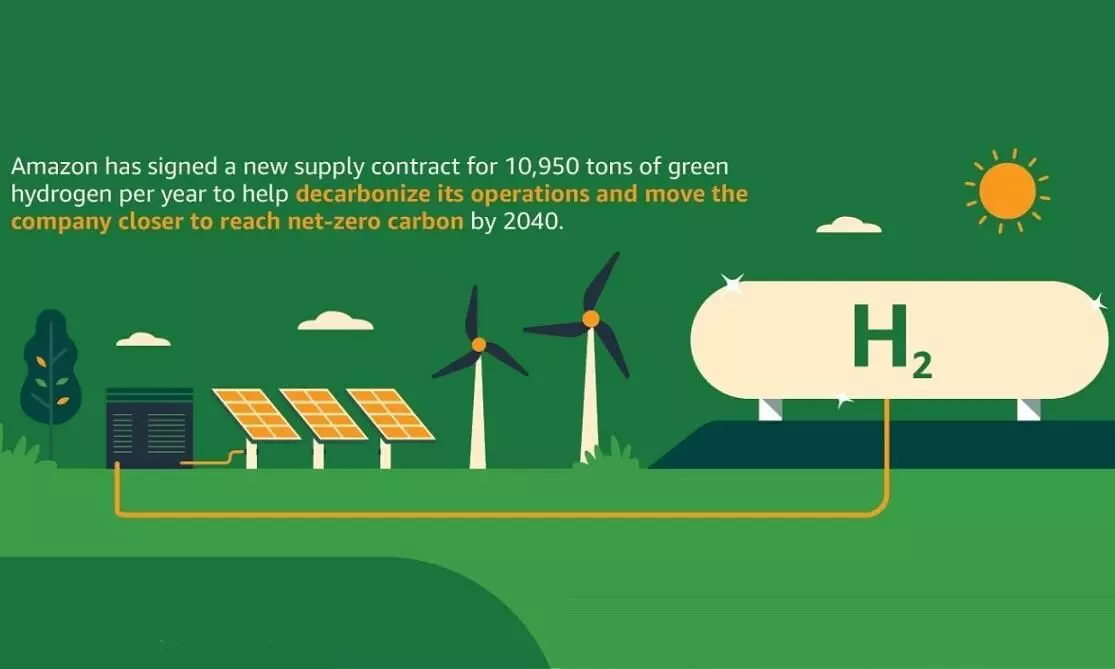
Amazon, Plug sign green hydrogen agreement
Deal to provide enough annual power for 30,000 forklifts or 800 heavy-duty trucks.

Amazon has signed a deal with Nasdaq-listed Plug Power Inc, a leading provider of turnkey hydrogen solutions, to provide liquid green hydrogen starting in 2025 to help decarbonise operations as part of its commitment to be net-zero carbon by 2040.
The deal with Amazon marks a growth opportunity for Plug, and is expected to help the company toward its 2025 $3 billion revenue goal, says an official statement.
"By building a complete hydrogen ecosystem from molecules to applications combined with a resilient network of green hydrogen plants around the world — we have made hydrogen adoption easy," says Andy Marsh, CEO, Plug. "Landing a green hydrogen supply deal with a customer like Amazon validates our multi-year investment and strategic expansion into green hydrogen. We are excited to expand our relationship with Amazon in exploring the use of other hydrogen applications, such as fuel-cell electric trucks and fuel-cell power generation stations that could provide electricity to Amazon buildings and the deployment of electrolyzers in fulfilment centres."
Kara Hurst, Vice President, Worldwide Sustainability, Amazon adds: "Amazon is proud to be an early adopter of green hydrogen given its potential to decarbonise hard-to-abate sectors like long-haul trucking, steel manufacturing, aviation, and ocean shipping. We are relentless in our pursuit to meet our Climate Pledge commitment to be net-zero carbon across our operations by 2040, and believe that scaling the supply and demand for green hydrogen, such as through this agreement with Plug Power, will play a key role in helping us achieve our goals."
The green hydrogen supply deal is a continuation of joint efforts between Amazon and Plug to expand the applications of green hydrogen beyond material handling. Since 2016, Plug has helped Amazon to deploy more than 15,000 fuel cells to replace batteries in forklifts across 70 distribution centres.
Amazon and Plug have signed a deal for Plug to supply 10,950 tonnes per year of liquid green hydrogen to fuel Amazon operations. "Using Plug's electrolyzers, liquefaction capabilities and cryogenic tankers, Plug will deliver hydrogen to Amazon beginning January 1, 2025."
The green hydrogen supply contract will provide enough annual power for 30,000 forklifts or 800 heavy-duty trucks used in long-haul transportation, Amazon said in a statement.
"We already have more than 70 fulfilment centres outfitted with hydrogen storage and dispensing systems, which will allow us to start using green hydrogen to replace fossil fuels," says Dean Fullerton, Vice President, Global Engineering and Security Services, Amazon. "Today, we use that system to power over 15,000 fuel-cell propelled forklifts, with plans to grow that number to 20,000 across 100 fulfilment centres by 2025. That's just the start. Across Amazon's operations, we're exploring and testing the use of other hydrogen applications, such as fuel-cell electric trucks and fuel-cell power generation stations providing electricity to Amazon buildings."
Amazon to invest $2bn in Plug
Plug has also granted Amazon a warrant to acquire up to 16,000,000 shares of which the exercise price for the first 9,000,000 shares is $22.9841 per share, which is based on the volume weighted average closing price of Plug common stock for the thirty trading days ending August 23, 2022. The exercise price for the remaining 7,000,000 shares will be an amount per share equal to ninety percent of the 30-day volume weighted average share price of Plug common stock as of the final vesting event that results in full vesting of the first 9,000,000 shares.
"Amazon would vest the warrant in full if it spends $2.1 billion over the seven-year term of the warrant across Plug products including, but not limited to, electrolyzers, fuel cell solutions, and green hydrogen."
Plug remains on track to produce 500 tonnes per day in North America by 2025, and 1,000 tonnes per day globally by 2028, the release added.

